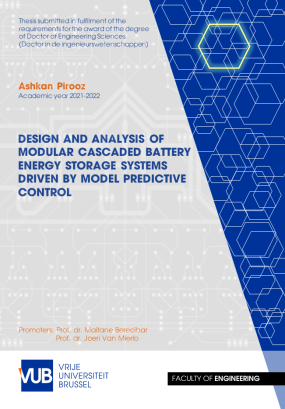
Due to broad usage of Li-ion battery energy storage systems (BESS) in a wide variety of applications from consumer electronics, automotive industry, to large-scale grid storage, the need for optimization and operation enhancements of such systems are inevitable. Batteries are produced in cell-level which depending on the application and consumer demands, multiple cells are connected in series or parallel to form the final storage subsystem reffered to as pack or cluster. In addition to this cell quantity expansion, nonlinear behavior of Li-ion batteries makes the need for a battery management system (BMS) to monitor and control each individual cell and the entire pack.
Typically, the pack is interfaced to the power consumer/source side to get discharged/charged through power converter stage(s). A dedicated BMS cicuitry and controller is also installed on the pack which is independent from the controller of the converter stage(s). An alternative BESS topology has emerged in recent years in which the pack is interfaced through a unique single-stage DC-AC modular multilevel converter to the AC-side with a centralized controller supporting BMS features and power conversion handling.
This PhD research investigates the before-mentioned alternative BESS structure by reconfiguration of battery units, and their connection to the AC-side. Instead of series and/or parallel fixed connection of units, each battery is connected to the output as an independent DC source of H-bridges. A multi objective BMS based on model predictive control is defined to accomplish primary tasks of providing high-quality controlled power on the AC-side, and management of batteries on the DC-side. Benefits of this approach could be summarized as avoiding additional cell balancing and circuitry which results in lower cost and computational efforts, higher reliability due to independent battery cell connection, and achieving a flexible system capable of tackling several storage-related tasks using only one unqiue controller.
The novel centralized BMS design is validated on laboratory-scale Li-ion battery cells interfaced through custom-made switching, monitoring, and load boards fro single-phase and three-phase systems under discharging operation, and battery models' simulations are performed to investigate charging operation. Finally, the proposed controller is compared to state-of-the-art solutions and relevant standards to see how it fits in automotive and stationary applications. The results demonstrate the feasibility of the developed BESS in steady state and transient conditions.
